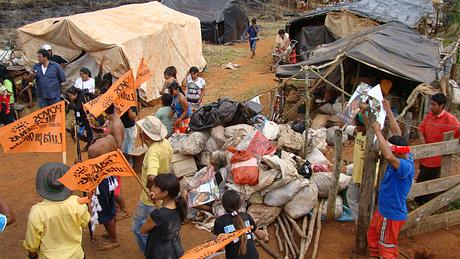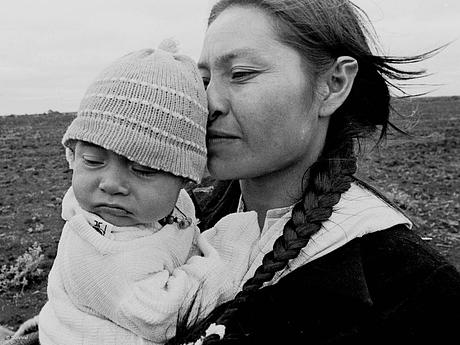Report to UN reveals shocking situation of Guarani tribe in Brazil
March 18, 2010
 © CIMI/Survival
© CIMI/SurvivalThis page was last updated in 2010 and may contain language which is now outdated.
The situation of the Guarani tribe of southern Brazil is one of the worst of all Indigenous peoples in the Americas, says a new report by Survival to the UN.
The release of the report coincides with the International Day for the Elimination of Racial Discrimination on 21st March.
The Guarani suffer high rates of suicide, malnutrition, unfair imprisonment and alcoholism, and are regularly targeted and killed by gunmen hired by the ranchers who have taken over their land.
The denial of the Indians’ land rights is singled out in the report as the main cause of this explosive situation.
The report warns that the growing demand for ethanol as an alternative to gasoline will take more land from the Guarani and further worsen the situation.
Despite living in one of the wealthiest states in one of the world’s largest emerging economies, many Guarani live in dire poverty. Some live under tarpaulins on the side of busy highways, others in chronically overcrowded ‘reserves’ where they are reliant on government handouts.
One Guarani community living on the roadside, who have seen three of their leaders killed by ranchers’ gunmen, said, ‘We are growing impatient with the excessive delay of land demarcation. It is slowly killing us and exposing us to genocide’.
Survival’s Director Stephen Corry said today, ‘This report exposes the appalling situation which the Guarani face. It is the Brazilian government’s moral and legal responsibility to ensure that the human rights abuses and the racial discrimination which the Guarani are suffering is stopped. If swift and efficient action is not taken, many more Guarani will suffer and die’.
Some facts
1. Violence: the Guarani suffer from violent attacks and many Guarani leaders have been assassinated. 42 Guarani were killed in Mato Grosso do Sul in 2008 because of internal and external conflicts.
2. Suicide: the suicide rate amongst the Guarani is one of the highest in the world. More than 625 Guarani have committed suicide since 1981 (almost 1.5% of the Guarani population), and in 2005, the Guarani suicide rate was 19 times the national rate. Guarani children as young as nine years old have taken their own lives.
3. Malnutrition and poor health: many Guarani suffer from malnutrition, and their infant mortality rate is more than double the national average, whilst life expectancy is more than 20 years lower than the national average.
4. Unfair imprisonment: Guarani are often wrongly imprisoned, with little or no access to legal advice and interpreters. They serve ‘disproportionately harsh sentences for minor offences’.
5. Exploitation of manual labourers: many Guarani are forced to work cutting sugar cane for the ethanol factories which now occupy their land. They earn pitiful wages and are exposed to inhumane working conditions.
Download the report (in English or in Portuguese)



